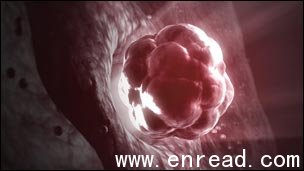| ||||||||||||||||||||||||||||||||||||||||||||||||||||||||||||||||||||||||||||||||||||||||||||||||||||||||||||||||
|
Scientists say they are closer to knowing why older women are more likely to produce abnormal eggs. 科学家称他们已进一步了解为何高龄妇女更有可能排出不正常的卵细胞。  The protein is a key factor in the ovulation process The Newcastle University team saw a fall in levels of proteins called cohesins, essential for chromosomes1(染色体) to divide properly for fertilisation. Writing in Current Biology, they said understanding this process could help develop ways to prevent cohesin(凝集蛋白) loss. Abnormal eggs are linked to infertility3, miscarriage4(流产,失败) and conditions including Down's Syndrome5. It was already known that pregnancy6 problems in older women can be linked to eggs containing the wrong number of chromosomes, but not why this occurred. Messy division All the cells in the body, except for sperm7 and eggs, contain two copies of each chromosome2. Sperm and eggs must lose one copy in readiness(准备就绪) for fertilisation, a complex process. Cohesins bind8 chromosomes together by entrapping9(诱骗,使陷入困境) them in a ring. This is essential for them to divide properly. If there is too little cohesin, the structure can be too "floppy10" for division to happen equally. In eggs, the problem is compounded by the fact that the physical attachments11 which hold chromosomes together are established before birth and must be maintained by cohesins until the egg divides just before ovulation(排卵) - which can be decades later. The researchers looked at eggs from young and old mice - and found cohesin levels declined with age. By tracking chromosomes during division in the egg, the Newcastle team found that the reduced cohesin in eggs from older females resulted in some chromosomes becoming trapped and unable to divide properly. Lead researcher Dr Mary Herbert, of the Centre for Life at Newcastle University, said: "Reproductive fitness in women declines dramatically from the mid-thirties onwards. Our findings point to cohesin being a major culprit(犯人,罪犯) in this. "The aged12 mice we used are equivalent to a woman in her early forties. "Cohesin levels were very much reduced in eggs from older mice and the chromosomes underwent a very messy division resulting in the wrong number of chromosomes being retained in the egg." Mismatches She said the next step was to look at human egg development, and work out why cohesin is lost with age. "If we can understand this, we will be in a better position to know if there is any possibility of developing interventions13 to help reduce cohesin loss." But Dr Herbert added: "Undoubtedly14, the best way for women to avoid this problem is to have their children earlier." Adam Balen, professor of reproductive medicine and surgery at the Leeds Centre for Reproductive Medicine, said the study was scientifically very interesting. "This is a neat explanation as to why we see mismatches in chromosomes as women get older." But Professor Balen, who is also chair of the British Fertility Society's practice and policy committee, added it was "far too early to say" if the finding would have any bearing on clinical care for older women with fertility problems. 点击  收听单词发音 收听单词发音
|
||||||||||||||||||||||||||||||||||||||||||||||||||||||||||||||||||||||||||||||||||||||||||||||||||||||||||||||||
上一篇:南非研制出新式高效净水设备 下一篇:日本研制出可体检马桶 |
||||||||||||||||||||||||||||||||||||||||||||||||||||||||||||||||||||||||||||||||||||||||||||||||||||||||||||||||
- 发表评论
-
- 最新评论 进入详细评论页>>



